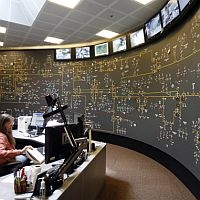
(Host) Vermont’s two largest electric utilities have reached an agreement to buy electricity from Hydro-Quebec for 26 years.
It’s a historic agreement and it caps more than a year of negotiations.
VPR’s John Dillon reports.
(Dillon) Vermont utilities have faced what they call the power supply gap. That’s the time frame over the next few years when current Hydro-Quebec contracts expire, and the Vermont Yankee nuclear plant is scheduled to retire.
The deal reached this week with Hydro-Quebec is for about a quarter of the state’s energy demand – so it fills a big piece of that gap. The agreement is in the form of a memorandum of understanding that sets out the terms of a contract that’s yet to be finalized.
Governor Jim Douglas had urged the state’s utilities to wrap up the negotiations.
(Douglas) "And I believe in order to secure our energy future, to minimize greenhouse gas emissions, to have a stable reliable competitive source for electricity in the future, a long term contract with Hydro Quebec is an important step forward."
(Dillon) The agreement calls for the new contract to extend from 2012 to 2038. Here are the main points: 225 megawatts of power; supplied 16 hours a day; 365 days a year. It’s a firm power contract, which means Vermont utilities would be required to buy the electricity and Hydro-Quebec would have to provide it.
The exact pricing provisions remain confidential. But Bob Young, CEO of Central Vermont Public Service, says the agreement ties prices to the wholesale energy market. He says there are safeguards to protect ratepayers against wide swings in energy prices.
(Young) "You know, power prices can spike and fall very rapidly over short periods of time, and what the pricing mechanism allows is for a much more stable, predictable price pattern, albeit one that does over time move with the market. But it takes the extremes out both on the upside and on the downside."
(Dillon). Green Mountain power CEO Mary Powell says the Hydro-Quebec agreement delivers what ratepayers have said they wanted: reliable power from a relatively clean energy source.
(Powell) We try to manage this from a portfolio perspective and we think this provides a nice anchor in the portfolio for the future.
(Dillon) Powell says it’s a favorable time to reach a deal as energy prices are relatively low.
(Powell) Because the actual starting price that will be set at the end of this calendar year will be based on kind of an average market price of what it has been historically and what it’s anticipated to be.
(Dillon) Governor Douglas says Vermont has been buying electricity from Canada for more than a century. But the state’s relationship with Hydro-Quebec really developed in the early 1980s when Governor Richard Snelling secured a long term power supply contract.
Montpelier lawyer Richard Saudek was Snelling’s negotiator at the time. He says the new deal continues the historic trade relationship with Quebec.
(Saudek) "To me the significance is that electricity flows internationally. It doesn’t care about borders…. And when you have a source of that size and that flexibilit, that ability to be reliable, you take advantage of it. And I think it’s a terrific resource for Vermont to take advantage of."
(Dillon) The agreement reached between the utilities and Hydro-Quebec encourages the Legislature to designate large scale hydro projects as renewable energy.
That could allow Hydro-Quebec to sell renewable energy credits to utilities in other states. Those states require utilities to provide a certain percentage of their power from renewable sources.
The deal says Vermont utilities would share the revenue from those renewable credit sales.
For VPR News, I’m John Dillon in Montpelier.